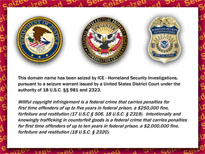Looking back at the past 12 months it’s fair to conclude that 2011 was the year that the entertainment industries focused on piracy-fueled Internet censorship. Domain seizures, DNS blockades, raids and arrests dominated the news, and the threat of the SOPA and PIPA bills in the US left millions of Internet users worried. Let’s see how events unfolded.
At the end of the year when new developments draw to a close, it’s time to take a look back and take stock. Below is our overview of some of the most interesting events we reported during the first half of 2011.
Take a deep breath…
January
After pressure from the entertainment industries, Google started to censor piracy-related keywords from its instant and autocomplete services. Keywords such as ‘torrent,’ ‘BitTorrent’ and ‘RapidShare’ were excluded from the start, and later in the year Google added a wide range of new terms including ‘The Pirate Bay.’
 Despite these efforts the RIAA remained dissatisfied, patronizing the search engine with a could-do-much-better “Report Card” in December.
Despite these efforts the RIAA remained dissatisfied, patronizing the search engine with a could-do-much-better “Report Card” in December.
The mass-BitTorrent lawsuits that entered the US during 2010 reached a new milestone in 2011 with the 100,000th person being sued for alleged copyright infringement. In January alone several prominent lawsuits were added. Anime distributor Funimation announced a lawsuit against 1337 alleged BitTorrent downloaders, and the rights holders of “The Expendables” and Paris Hilton sex tape did the same.
One alleged BitTorrent user paid a mysterious settlement of $250,000.
There was also positive news from the UK, when so-called Speculative Invoicing schemes there came to an end, at least for a few months. ACS:Law, the law firm that had terrorized untold thousands of alleged file-sharers in the UK, quit the anti-piracy business and went into bankruptcy a while later. ACS:Law’s Andrew Crossley was honored with the title of “Internet Villain” of the year and will now face the Solicitors Disciplinary Tribunal in early 2012.
Two lawyers who were responsible for introducing Speculative Invoicing to the UK were fined and banned from practicing for 3 months. David Gore and former partner Brian Miller of the law firm Davenport Lyons were each told to pay a £20,000 fine and interim costs of £150,000 for their professional misconduct.
Meanwhile, RapidShare and Megaupload fought back against entertainment industry propaganda.
February
Early February, the Department of Justice (DOJ) and Homeland Security’s Immigration and Customs Enforcement (ICE) seized several domains belonging to major sports streaming sites. One of the websites was Rojadirecta, an unusual target because two courts in Spain previously ruled that the site operates legally. Rojadirecta appealed the seizure but thus far without result.
 In response to domain seizures many people voiced concern that they may be unconstitutional. US Senator Ron Wyden feared that the seizures could stifle free speech, and this indeed turned out to be the case as the US government shut down 84,000 websites by mistake late February.
In response to domain seizures many people voiced concern that they may be unconstitutional. US Senator Ron Wyden feared that the seizures could stifle free speech, and this indeed turned out to be the case as the US government shut down 84,000 websites by mistake late February.
In Australia, the Federal Court dismissed the movie industry’s appeal against a 2010 ruling which found that Internet service provider iiNet is not responsible for copyright infringements carried out by its file-sharing customers. This decision was appealed once more and is now with the High Court.
Oh, and despite rampant piracy Hollywood box office grosses worldwide surpassed the magic $30 billion mark for the first time in history.
March
Following the February seizure of several domains belonging to major sports streaming sites, the feds arrested the operator of Channelsurfing.net in March. The 32-year-old Texan Bryan McCarthy was taken into custody on suspicion of criminal copyright infringement. In November, McCarthy was indicted on several copyright related charges. Awaiting his trial, the psychologically-troubled operator pleaded not guilty on all counts.
In the same month President Obama’s “IP Czar” Victoria Espinel laid the foundations for PIPA and SOPA, calling on Congress to make changes in order to make it easier to clamp down on copyright infringement. Among the recommendations were calls to turn streaming into a felony alongside authority to wiretap in copyright cases. Music industry expert, book author and Grammy winner Moses Avalon welcomed the plans, which he declared would signal the end of TorrentFreak.
In the ongoing mass BitTorrent lawsuits, U.S. District Court Judge Beryl Howell laid down a landmark verdict that would make it easy for copyright holders – the makers of The Hurt Locker in particular – to send cash demands to people they suspect of copyright infringement. The fact that Howell previously worked as an RIAA lobbyist and as the Managing Director of a pirate-chasing outfit led to suggestions of a conflict of interest.
Meanwhile in Belarus, a pirated copy of The Hurt Locker aired on national TV.
April
In April, worries about the US domain seizures prompted another major torrent site to move to a new domain as a precaution. KickassTorrents, one of the most visited torrent sites on the Internet, replaced its .com domain name with the Philippine extension .ph.
 At the same time a group called MAFIAAFire coded a browser plugin to make these type of domain transitions go more smoothly by automatically redirecting users to these new homes. The release went viral and in the following months more than 200,000 people installed the add-on. ICE wasn’t happy with this and asked Mozilla to pull the add-on from their site. However, Mozilla denied the request, arguing that this type of censorship may threaten the open Internet.
At the same time a group called MAFIAAFire coded a browser plugin to make these type of domain transitions go more smoothly by automatically redirecting users to these new homes. The release went viral and in the following months more than 200,000 people installed the add-on. ICE wasn’t happy with this and asked Mozilla to pull the add-on from their site. However, Mozilla denied the request, arguing that this type of censorship may threaten the open Internet.
An Italian court ordered all ISPs to block subscriber access to BTjunkie, leaving hundreds of thousands of Italians with the task of finding a new torrent site. At least, that was the plan. Just hours after the news was made public, a brand new and ad-free proxy site was launched. The site allowed Italians to browse an uncensored web and access BTjunkie, as well as another popular blocked site, The Pirate Bay.
May
In May, US lawmakers introduced the PROTECT IP Act (PIPA), a bill that delivers a wide range of censorship tools authorities and copyright holders can use to quash websites they claim are facilitating copyright infringement. It is basically a revamped and worsened version of the controversial COICA proposal which had to be resubmitted after its enaction failed last year. Two weeks after its introduction, the Senate’s Judicial Committee unanimously approved the bill and it now awaits the senate vote.
In the same week as PIPA was introduced, three U.S. Senators presented the Commercial Felony Streaming Act, a bill that would make streaming unauthorized music, movies and TV-shows a felony. The bill is said to address a gap in current legislation where streaming is not considered a criminal offense.
The popular video streaming site “Fast Pass TV” was shut down following the arrest of one of the site’s alleged operators. The site itself didn’t host any copyrighted content but indexed videos hosted on third-party sites.
 In the US the controversial mass-BitTorrent lawsuits continued. Early May the makers of the Expendables set a record when they sued 23,322 people at once, but this record was broken a few weeks later when The Hurt Locker lawsuit was updated to include 24,583 alleged BitTorrent users. Both cases were dismissed a few months later.
In the US the controversial mass-BitTorrent lawsuits continued. Early May the makers of the Expendables set a record when they sued 23,322 people at once, but this record was broken a few weeks later when The Hurt Locker lawsuit was updated to include 24,583 alleged BitTorrent users. Both cases were dismissed a few months later.
In another mass-BitTorrent lawsuit – VPR Internationale v. Does 1-1017- Judge Harold Baker denied a Canadian adult film company permission to subpoena ISPs for the personal information connected to the IP-addresses of their subscribers. The reason? IP-addresses are not people, and especially in ‘adult entertainment’ cases this could obstruct a ‘fair’ legal process.
US authorities resumed “Operation In Our Sites” and seized several domain names associated with copyright infringement or counterfeit related crimes. Among the new targets were two sites that linked to copyrighted films hosted on third-party streaming sites such as megavideo.com and veoh.com.
Oh, and in the midst of all the censorship talk The Pirate Bay moved their severs to a secret mountain complex after Comcast offered help to fix a network issue.
June
A report from the UN’s Human Rights Council labeled Internet access a human right, arguing that laws which allow for the disconnection of Internet users are disproportionate and should be repealed.
Richard O’Dwyer, the 23-year-old UK-based administrator of a TV show and movie links site was arrested by police. Following his detention in the UK’s largest prison, the admin continued fighting his extradition to the U.S.
On June 11th 2011, Europe witnessed one of the largest piracy-related busts in history. The popular movie streaming portal Kino.to was shut down and a dozen people connected to the site were arrested.
As collateral damage, several file-hosting services connected to Kino.to also went down. Several people went on trial for their part in the site’s operation and the main admin was sentenced to three years in prison. Interestingly, a report published after the raids revealed that Kino.to’s users were actually the movie industry’s best customers.
—
Part 2 follows.
 The
PirateBox does not connect to the Internet, nor does it operate from
your hard drive. It works entirely on the USB thumbdrive you install it
on, simply using your computer's WiFi to network all who are in range.
The
PirateBox does not connect to the Internet, nor does it operate from
your hard drive. It works entirely on the USB thumbdrive you install it
on, simply using your computer's WiFi to network all who are in range.




















 Despite these efforts the RIAA remained dissatisfied, patronizing the search engine with a could-do-much-better “
Despite these efforts the RIAA remained dissatisfied, patronizing the search engine with a could-do-much-better “ In response to domain seizures many people voiced concern that they may be unconstitutional. US Senator Ron Wyden
In response to domain seizures many people voiced concern that they may be unconstitutional. US Senator Ron Wyden  At the same time a group called MAFIAAFire coded a browser plugin to make these type of domain transitions go
At the same time a group called MAFIAAFire coded a browser plugin to make these type of domain transitions go  In the US the controversial mass-BitTorrent lawsuits continued. Early May the makers of the Expendables set a record when they sued
In the US the controversial mass-BitTorrent lawsuits continued. Early May the makers of the Expendables set a record when they sued 
 When Homeland Security’s ICE unit started seizing domain names last year, a group called “
When Homeland Security’s ICE unit started seizing domain names last year, a group called “












